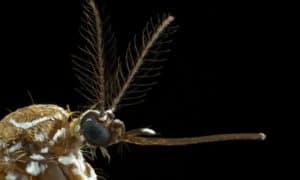
The head of an Aedes aegypti female mosquito.
Credit: Alex Wild
Female mosquitoes are known to rely on an array of sensory information to find people to bite, picking up on carbon dioxide, body odor, heat, moisture, and visual cues. Now researchers reporting in the journal Current Biology on March 28 have discovered how mosquitoes pick up on acidic volatiles found in human sweat.
The key is an olfactory coreceptor known as Ir8a. Mosquitoes lacking a functional version of the Ir8a gene were much less attracted to people, the researchers found. The findings potentially suggest new approaches for designing new and improved mosquito repellents.
“Removing the function of Ir8a removes approximately 50 percent of host-seeking activity,” says senior author Matthew DeGennaro, a mosquito neurobiology researcher at Florida International University in Miami. “Odors that mask the IR8a pathway could be found that could enhance the efficacy of current repellents like DEET or picaridin. In this way, our discovery may help make people disappear as potential hosts for mosquitoes.”
On the flip side, the Ir8a pathway also could […]










When I lived in Florida for 17 years, working in the Everglades as a surveyor, I and many others just ate a lot of garlic and that simple solution worked quite well to keep the mosquitoes away.